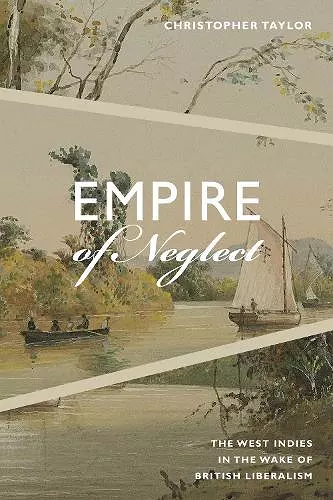Empire of Neglect
The West Indies in the Wake of British Liberalism
Format:Paperback
Publisher:Duke University Press
Published:18th May '18
Currently unavailable, and unfortunately no date known when it will be back

Following the publication of Adam Smith’s The Wealth of Nations, nineteenth-century liberal economic thinkers insisted that a globally hegemonic Britain would profit only by abandoning the formal empire. British West Indians across the divides of race and class understood that, far from signaling an invitation to nationalist independence, this liberal economic discourse inaugurated a policy of imperial “neglect”—a way of ignoring the ties that obligated Britain to sustain the worlds of the empire’s distant fellow subjects. In Empire of Neglect Christopher Taylor examines this neglect’s cultural and literary ramifications, tracing how nineteenth-century British West Indians reoriented their affective, cultural, and political worlds toward the Americas as a response to the liberalization of the British Empire. Analyzing a wide array of sources, from plantation correspondence, political economy treatises, and novels to newspapers, socialist programs, and memoirs, Taylor shows how the Americas came to serve as a real and figurative site at which abandoned West Indians sought to imagine and invent postliberal forms of political subjecthood.
"Dexterously brings together a range of long-neglected texts and voices. . . . Empire of Neglect fruitfully adds to critical conversations about shifts in late coloniality in the long nineteenth century and will interest Americanists working in a variety of period subfields." -- Duncan Faherty * American Literary History *
"In Empire of Neglect, Christopher Taylor presents a compelling argument that free trade undermined not only the commercial protections the colonists expected but also the social contracts they felt they were owed. . . . Recommended. Graduate students, researchers, faculty." -- W.T. Martin * Choice *
"A brilliantly conceived and beautifully executed study. . . . Simply put, Empire of Neglect is a field-making book. Because it sets itself so resolutely against not only the methodological protocols, but even the typical discursive structures of work explicitly or tacitly aligned with economic liberalism, it is by no means an easy or accessible read. Rather, it insists upon the dissonance that comes with questioning the basic premises of existing Americanist and Victorianist understandings of the Atlantic and the Hemispheric discursive frames. But for that reason, this remarkable piece of scholarship rewards careful reading and rereading, and promises to gradually but inexorably shape all that comes after it." -- Martha Schoolman * Review 19 *
"Empire of Neglect is exemplary for the ways it illustrates the worlds of critique and self-fashioning that are opened when we look elsewhere and otherwise." -- Adom Getachew * Small Axe *
"In a world dominated by the competitive logic of free trade, what happens to those groups and places whose diminished profitability consigns them to feelings of abandonment and neglect? Christopher Taylor’s Empire of Neglect gives that question a hefty dose of historical depth. ... His book will be of interest not only to specialists but also to anyone who is receptive to a set of sensitive reflections on the price that has been paid by any group or region that loses its centrality because the logic of market capitalism has passed it by." -- Theodore Koditschek * Victorian Studies *
"Taylor's contribution to the study of liberalism and empire should be widely read, as neglect and abandonment are still matters of heated argument and material consequence in both postcolonial and still-colonial territories around the world." -- René Johnannes Kooiker * Modern Language Quarterly *
"[Empire of Neglect] is an important study that, by treating neglect as a political concept deeply connected to British liberalism, has much to say about how some in the Caribbean responded to that new reality." -- Christienna Fryar * New West Indian Guide *
ISBN: 9780822371151
Dimensions: unknown
Weight: 431g
320 pages